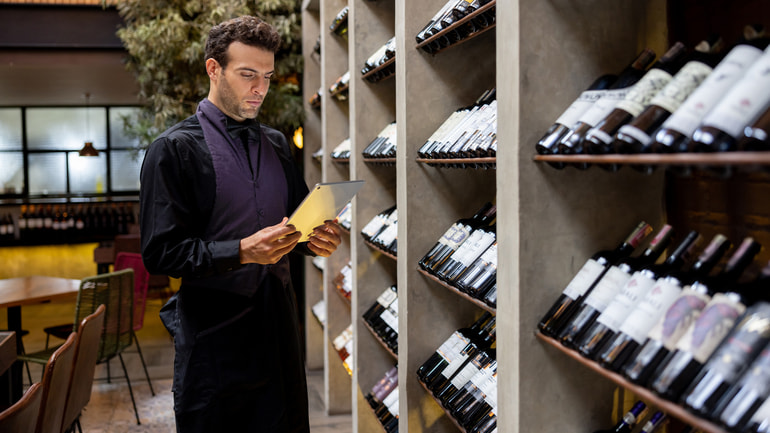What’s better than the finest steak at your restaurant? The answer is simple: that same steak paired with the perfect glass of wine. The key is knowing how to make the right pairing. This kind of expertise is precisely the domain of a restaurant sommelier.
A sommelier is a critical member of your culinary dream team. Together, with your chef, they’ll ensure the beverages on your menu complement the dishes in the best way possible. However, if you’ve never tried to hire a sommelier before, you might have some questions about the process and whether it’s the right move for you, like:
- What is a sommelier in a restaurant?
- What does a sommelier do on a daily basis?
- Why do you need a restaurant sommelier?
- How do you hire a sommelier?
In this guide, we’ve got the answers. It’s wine o’clock – let’s get started.
What is a Sommelier in a Restaurant?
The traditional sommelier definition centers around the idea of being a “wine steward.” But where does the role stem from? (Wine pun intended). Hundreds of years ago in the houses of nobility, sommeliers had multifaceted roles. Part of this included choosing and sampling the wines that would be served to the lords and ladies of the house.
Historical trivia aside, the sommelier job description still largely revolves around wine in today’s restaurants. However, the modern sommelier definition has some nuances.
For instance, a restaurant sommelier may also manage other areas of a beverage program, like beer and spirits. They might even work another role entirely, such as front of house manager, if they’re not always needed for sommelier duties. This is often the case in restaurants that don’t require a full-time sommelier.

What Does a Sommelier Do?
Now that we’ve covered a basic restaurant sommelier definition, let’s take a closer look at the sommelier job description. Here are four key areas of responsibility.
Wine Procurement
Sommeliers scour the globe for the best wines to include on their restaurant’s menu. In their search, they consider several key factors, including:
- How the wine pairs with the food dishes on the menu
- Whether the wine is likely to appeal to the restaurant’s guests
- What region the wine is from
- Whether the wine can fill a gap on the menu (think region, grape variety, or price)
- Advantages of the winery, like sustainable or organic grape growing practices
- The wine’s seasonality (think rosé on the patio in summer or port with dessert in winter)
- The overall profitability of the restaurant’s wine list
Wine Storage
Curating a stellar wine list is only the beginning for a sommelier. Wine storage and bar inventory management are also essential duties involved in the role.
A well-trained sommelier will know that wine bottles should be stored in a safe location where restaurant staff can easily access them. They’ll be sure to keep the wine out of direct sunlight, in an area where the temperature stays consistently cool, and to store the bottles horizontally so that the corks stay moist.
A sommelier will also know the par levels for each type of wine you sell (the minimum amount you need to have on hand) and will keep an eye on stock to ensure you never run out of the best sellers. They’ll take care of monitoring wine sales data and placing inventory orders, too.
Wine Service
Wine service can make or break the guest experience at your restaurant. A pro sommelier will help you develop an air-tight wine training program, so your entire front of house staff will be knowledgeable and will feel confident when it comes to this crucial element of service.
As part of the training program, a sommelier will make sure servers know the wine list inside and out, and understand how to properly handle wine bottles and pour wine at the table.
Pairing Recommendations
A sommelier’s ability to expertly pair wines with the dishes on your menu is where this role really shines. While a seasoned sommelier understands that taste preferences are subjective, there are a few go-to strategies they use to make pairings, including:
- Considering the intensity of flavors (i.e. they’ll know to avoid matching a mild wine with a pasta dish covered in a rich Alfredo sauce)
- Selecting pairings based on the dish’s most dominant flavor (hint: it may not be the meat, but rather the sauce)
- Understanding what kind of wine to pair with dishes that have strong spices (think Chinese or Indian food)

Why Do You Need a Sommelier?
Hiring a restaurant sommelier is not necessary for every type of venue. However, it’s a wise move for fine dining restaurants to consider for several reasons.
1. Elevates the Menu
You put a lot of time and effort into your menu. Why not elevate it even more by getting strategic about your wine list? After all, the right wine pairings can only make your dishes better, accentuating the flavors and textures.
“Advice from a skilled sommelier or waiting staff may encourage diners to be more adventurous by providing confidence that their selections will work well together,” according to Le Cordon Bleu. This can also translate into guests purchasing more expensive bottles.
In addition, since a sommelier will handle wine inventory at your restaurant, your entire beverage list will be more refined and curated as a result of their knowledge.
2. Enhances the Guest Experience
We’ve all been out to dinner at a restaurant and asked for a wine recommendation, only to have the server come up with nothing. It’s not a great look for your restaurant.
In contrast, when a knowledgeable staff member can provide expert advice right there, it takes the guest experience to a five-star level, ultimately enhancing the table service. This is critical to help you rise above your competition and turn first-time diners into loyal regulars.
3. Adds Cachet
Not every restaurant has a sommelier, so hiring one can make your venue stand out by giving you an extra boost of prestige. Guests who want white glove service will love the attention and care they’ll receive from a sommelier.
A sommelier can also help you expand your business by hosting wine events at your restaurant, or entering to win awards that could garner media attention for your brand.

How to Hire a Sommelier for Your Restaurant
If you’re ready to hire a sommelier, these simple steps will help you find the right fit for your restaurant.
Create a Sommelier Job Description
Restaurant job descriptions vary widely, so crafting the right job description is essential for attracting the best sommelier candidates.
Be sure to write a job description that’s both clear and compelling. It should communicate to potential candidates exactly what you’re looking for and what the role entails.
It should also help candidates get a feel for your restaurant, so they can understand whether they’d be a good fit for you and vice versa. For instance, a sommelier who is passionate about local, organic wine could be the perfect hire for a restaurant with the same focus.
Post the Role in the Right Places
Depending on your budget and how much time you have, you may choose to work with a recruiter to help you find a sommelier. This is, of course, the more expensive option.
Or, you can take matters into your own hands and head to LinkedIn, where job seekers are active on a regular basis. Good old fashioned word of mouth is always another great option, especially if you can get a personal recommendation from someone who has actually worked with the sommelier candidate before.
Look for Specific Qualifications
While you don’t need a Master Sommelier (someone who’s received training at the highest level), a sommelier should have completed some specific training.
For example, “The title and credential of ‘Certified Sommelier’ is well recognized in the hospitality sector globally,” according to the Court of Master Sommeliers, Americas. “Wearing the Certified Sommelier lapel pin ensures an employer and dining public that [a sommelier has] skills in salesmanship, the beverage program, and wine tasting abilities that have been tested.”
Ask the Right Questions
A sommelier’s qualifications and knowledge of wine are only part of the package. It’s also important to look for someone who genuinely enjoys working in hospitality and providing outstanding service to guests.
Asking restaurant interview questions about why a candidate got involved in the industry or how they’ve handled difficult situations with diners can elicit insightful answers.
Hiring a restaurant sommelier can elevate your menu, enhance your guest experience, and add cachet to your brand. You’re now well versed in the basics of the role, so if it sounds like something your restaurant needs, you can hit the pavement with these hiring tips. Cheers to finding your perfect sommelier!
Download your free employee handbook template
Sign up for our free weekly TouchBistro Newsletter







